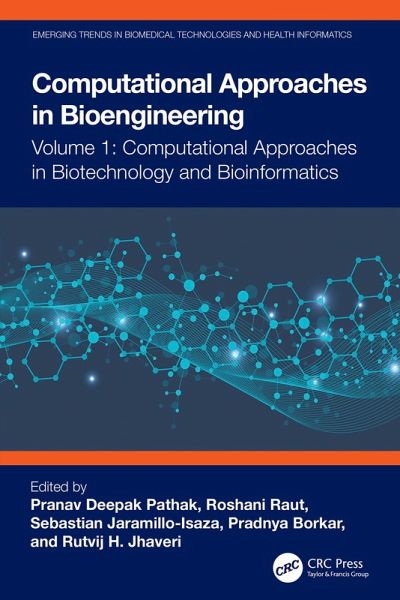
Computational Approaches in Biotechnology and Bioinformatics (eBook, PDF)
Versandkostenfrei!
Sofort per Download lieferbar
163,95 €
inkl. MwSt.
Weitere Ausgaben:

PAYBACK Punkte
82 °P sammeln!
Volume 1 of Computational Approaches in Bioengineering-Computational Approaches in Biotechnology and Bioinformatics-explores many significant topics of biomedical engineering and bioinformatics in an easily understandable format. It explores recent developments and applications in bioinformatics, biomechanics, artificial intelligence (AI), signal processing, wearable sensors, biomaterials, cell biology, synthetic biology, biostatistics, prosthetics, big data, and algorithms. From applications of biomaterials in advanced drug delivery systems to the role of big data, AI, and machine learning in...
Volume 1 of Computational Approaches in Bioengineering-Computational Approaches in Biotechnology and Bioinformatics-explores many significant topics of biomedical engineering and bioinformatics in an easily understandable format. It explores recent developments and applications in bioinformatics, biomechanics, artificial intelligence (AI), signal processing, wearable sensors, biomaterials, cell biology, synthetic biology, biostatistics, prosthetics, big data, and algorithms. From applications of biomaterials in advanced drug delivery systems to the role of big data, AI, and machine learning in disease diagnosis and treatment, the book will help readers understand how these technologies are being applied across the areas of biomedical engineering, bioinformatics, and healthcare. The chapters also include case studies on the role of medical robots in surgery and the determination of protein structure using genetic algorithms. The contributors are all leading experts across multiple disciplines and provide chapters that truly represent a complete view of these state-of-the-art technologies.
FEATURES
This book is ideally designed for biomedical professionals, biomedical engineers, healthcare professionals, data engineers, clinicians, physicians, medical students, hospital directors, clinical researchers, and others who work in the field of artificial intelligence, bioinformatics, and computational biology.
FEATURES
- Covers a wide range of subjects from biomedical engineering like wearable devices, biomaterials, synthetic biology, phytochemical extraction, and prosthetics
- Explores AI, machine learning, big data analysis, and algorithms in biomedical engineering and bioinformatics in an easily understandable format
- Includes case studies on the role of medical robots in surgery and the determination of protein structure using genetic algorithms
- Discusses genetic diagnosis, classification, and risk prediction in cancer using next-generation sequencing in oncology
This book is ideally designed for biomedical professionals, biomedical engineers, healthcare professionals, data engineers, clinicians, physicians, medical students, hospital directors, clinical researchers, and others who work in the field of artificial intelligence, bioinformatics, and computational biology.
Dieser Download kann aus rechtlichen Gründen nur mit Rechnungsadresse in A, B, BG, CY, CZ, D, DK, EW, E, FIN, F, GR, HR, H, IRL, I, LT, L, LR, M, NL, PL, P, R, S, SLO, SK ausgeliefert werden.



